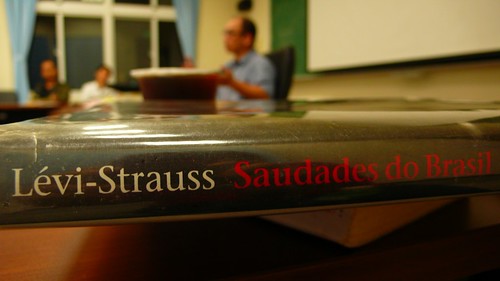出席狀況:博士班 5人( 2女、 3男);碩士班 7人( 6女、 1男):校外博士班:1人(男)






Narrative as Metaphor: The Concept of Traveling
The portion of the first part (Ch 1-4) of Tristes Tropiques centers on the notion of traveling, metaphorized as a way to pursue knowledge: “Nowadays, being an explorer is a trade, which consists not, as one might think, in discovering hitherto unknown facts after years of study, but in covering a great many miles and assembling lantern-slides or motion picture, preferably in colour, so as to fill a hall with an audience for several days in succession” (1973[1955]:17-8). Ironically, the way to pursue knowledge meanwhile has become a traveler’s fate—“doomed to have only a very remote resemblance to the inevitably false picture we were already conjuring up” (ibid:19). Traveling or exploring no longer represents the “magic caskets full of dreamlike promises,” but a “proliferating and overexcited civilization” (ibid:37). “What else can the so-called escapism of traveling do than confront us with the more unfortunate aspects of our history?” In Lévi-Strauss’s sense, the images that traveling brings to his readers are “the illusion of something which no longer exists but still should exist” (ibid:38). After all, yet, we are in the process of creating a “mass civilization” (ibid.). That is why Lévi-Strauss writes, “however honest the narrator may be, he cannot—since this is no longer possible—supply them in a genuine form” (ibid:39).
There was a time when traveling brought the traveler into contact with civilization which were radically different from his own and impressed him in the first place by their strangeness. During the last few centuries such instances have become increasingly rare. Whether he is visiting India or America, the modern traveler is less surprised than he cares to admit. … The search for the exotic boils down to the collecting of earlier or later phases of a familiar pattern of development (ibid:86).Traveling hence becomes a way to grasp power which “finds expression in the writing of newspaper articles and bestsellers and in lecturing to packed halls” (ibid:41). In this sense, traveling itself utters a use of metaphor which can “sanctify the traveler” and in this perspective, “the savages of the Amazonian forest are sensitive and powerless victims, pathetic creatures caught in the toils of mechanized civilization” (ibid.). If we recall Lakoff and Johnson’s argument, traveling itself creates a metaphor of disengagement through travel to remote foreign countries, and then a re-engagement when returning as a traveler to have such a power to identify reality of our own life by showing travelogues. So, why does Lévi-Strauss hate traveling and explorers? Lévi-Strauss writes,
… I refuse to be the dupe of a kind of magic which is still more feeble than their own and which brandishes before an eager public albums of coloured photographs, instead of the now vanished native masks. Perhaps the public imagines that the charms of the savages can be appropriated through the medium of these photographs. Not content with having eliminated savage life, and unaware even of having done so, it feels the need feverishly to appease the nostalgic cannibalism of history with the shadows if those that history has already destroyed (ibid:41).There are thus only two possibilities of being a traveler—either being a traveler of the olden days, who faces a stupendous spectacle and yet is unable to perceive its meanings, or being a traveler who is “chasing after the vestiges of a vanished reality” (ibid:43). Lévi-Strauss writes that “I am subject to a double infirmity: all that I perceive offends me, and I constantly reproach myself for not seeing as much as I should” (ibid.).
Such a sense of “nostalgia” for the vanishing plurality of the past causes Lévi-Strauss’s own journey back to search for the primitive knowledge. Paradoxically, what Lévi-Strauss himself conducts echoes as a traveler looking for something which exists no more. Lévi-Strauss writes, “Through a remarkable paradox, my life of adventure, instead of opening up a new world to me, had the effect rather of bringing me back to the old one, and the world I had been looking for disintegrated in my grasp” (ibid:376). Thus Lévi-Strauss agrees that he is a man of the nineteenth century (Eribon 1988:181). In response to this question during the interview with Eribon, Lévi-Strauss refers to James Boon’s work (1972), in which he himself is in comparison to Proust and Baudelaire. Lévi-Strauss answers that “I have the feeling that if someone waved a magic wand and I were transported to that time without losing my twentieth-century consciousness, I would not feel too far from home. There I would find the seeds of our great inventions before this progress essentially became devoted to creating the remedy for the discomfort it causes” (Eribon 1988:181).
The assumption of nature vs. culture that runs through Lévi-Strauss’s works is the basic opposition on which the whole conceptual system rests. Inherited from Mauss’s study in Australian aborigines, Lévi-Strauss has learned that the solidarity may be best “achieved by setting up a structure of reciprocity: a system of exchanges binding the segments in alliances” (Kuper 1993[1973]:162).
According to Lévi-Strauss, exchanges may involve one of three media: goods and services, language and symbols, and super-gift, women. Underlying the system of exchange is the rule of reciprocity, the rule that every gift demands a return. Yet, in his theory of kinship, forcing men to exchange their women, that marked the movement from nature to culture, links to the idea of incest taboo. The incest taboo indicates the conception between women who are permitted and women who are forbidden and thus “generates a distinction between women of the category wife and women of the category sister” (Leach 1974:45). Leach claims that “Incest and exogamy are therefore opposite sides of the same penny, and the incest taboo is the cornerstone of society” (p61). For Lévi-Strauss, societies are like a system of “communication.” Women are “exchanged” as a sort of message between groups, and these exchanges are linked up with other forms of communication, particularly the communication of goods and symbols of status.
For Lévi-Strauss, both “complex” and “primitive” societies “should be successfully interpreted to provide universally valid conclusions from a synchronic or diachronic point of view.” When Lévi-Strauss says that “my intelligence is Neolithic,” it is referring to this same complex imbrication of reality. The idea of Neolithic is threefold. First, the substantial mode of Neolithic is metaphorized to Lévi-Strauss himself as a way to pursue knowledge. In Tristes Tropiques, he writes,
For Lévi-Strauss, both “complex” and “primitive” societies “should be successfully interpreted to provide universally valid conclusions from a synchronic or diachronic point of view.” When Lévi-Strauss says that “my intelligence is Neolithic,” it is referring to this same complex imbrication of reality. The idea of Neolithic is threefold. First, the substantial mode of Neolithic is metaphorized to Lévi-Strauss himself as a way to pursue knowledge. In Tristes Tropiques, he writes,
I have a Neolithic kind of intelligence. Like native bush fires, it sometimes sets unexplored areas alight; it may fertilize them and snatch a few crops from them, and then it moves on, leaving scorched earth in its wake. (Tristes Tropiques p53)And being interviewed nearly 30 years later, he would add that
In Tristes Tropiques I said that I have a neolithic mind. I’m not the kind of person who can capitalize on or make what I’ve acquired bear fruit—instead I keep moving along an endlessly shifting boundary. Only the work of the moment counts for me, and it is over very quickly. I don’t have the inclination or the need to record my progress. (Eribon 1988:vii-viii)Second, it literally refers to the period of human history that provides the arts of civilization including agriculture, animal husbandry, pottery, weaving, conservation and preparation of food. This would be analogous to saying that all societies are “civilized” societies, rather than a proclamation of superiority of one to the other. “No one today would any longer think of attributing these enormous advances,” says Levi-Strauss, “to the fortuitous accumulation of a series of chance discoveries or believe them to have been revealed by the passive perception of certain natural phenomena.” As Leach expresses, Lévi-Strauss “conceives of primitive people as ‘reduced models’ of what is essential in all mankind.” Such idealization or “reductionism” is clearly identified by the following passage: “There are only three possible elementary kinship structures; these three structures are constructed by means of two forms of exchanges; and these two forms of exchange themselves depend upon a single differential characteristic, namely the harmonic or disharmonic character of the regime considered.”
Third and last, in return, the rhetorical use of Neolithic as a way to express the unity of all cultures is brought to the realm of cognition as a type of “savage mind.” Yet, who is this savage? Is he a certain person in the Neolithic period or Lévi-Strauss himself in the present society? Does the work titled The Savage Mind, refers to a Neolithic mind or Lévi-Strauss’s own argument? The puzzle may of course be found, if not dangerously then with a degree of insight in the intellectual history of Lévi-Strauss himself. As Clifford Geertz points out, Lévi-Strauss’s “personal relationship to his object of study is, perhaps more than for any other scientist, inevitably problematic.” This is because Lévi-Strauss’s synchronic mode of research, which revivifies history as the present, achieves a synchronic structure that obtains the independent significance in the logic of things. It is like a “kaleidoscope image of ‘concrete thought,’” as Geertz comments on Tristes Tropiques, “a syntactic conjunction of discrete elements…rather than a hierarchy of continuate elements.”
3 則留言:
CL-S不只是香味上的令人驚豔的、多層次的,就連對一個空間的敘述也讓人重新思維的看法,值得,值得再看的讀本,雖然看起來很憂鬱。
從旅行的角色開始,我們即不斷的反省自身的角色與其所所處的文化思維反射,Lévi-Strauss認為,旅行中的五種座標即反應其旅行者在記述過程的完整呈現;亦即時間、社會階層結構(旅行者自身)及空間上的三個座標,當然這所反應出來的是就算是熟悉在地或為融入在地的參與觀察者,其所代表的正是一種過客的狀況,特定時間內所出現特定的角色(通常這種角色,有時可能是雇主的身份,有時可能化約為受訪者家人的一份子,或是代表者國家的一種角色)。
但不論多麼的融入在地的生活,然而對旅行者原有的文化背景及思考下,我們終究對它者的文化是陌生的,甚是不為理解的,對於踏入初踏入印度的城市空間的Lévi-Strauss,即對其生活空間的感受大為不同,「不論我們想的是舊世界木乃伊化了的城市,還是新世界仍在胚育中的城市,我們經常把我們最高的價值,不論是物質的或是精神的,和城市生活聯想在一起……我們期望城市生活為我們提供有組織的防避的這一切東西,我們不惜代價去怨恨去拒斥的這一切事情,共同居住的這一切副產品,在印度都絲毫無礙於他們這樣的群聚。這些變成類似的一種自然環境……」於是自身所認知的城市空間,將被挑戰成為另一種生活空間的詮釋,城市在不同文化的詮釋下所產生不同的變化。
另外,在旅行者的切入在地的生活角色中,其中最讓人理解的是,不論你多麼的拒絕社會的階級化的差距,但在切入他們的生活作為一個觀察者的角色時,你已唐突的變成一個外文化的觀察者,不只是不同於他們,或是更優於他們的位置。印度的街上乞討的人更是認為,一個觀光客的位置與他們的差距是必須存在的,之於他們而言唯有保持有差距的身份,才無礙他的向觀光客乞討的可能性。
觀察,建立一個可具反射思唯的基礎,對於一個地方的詮釋,除了將地方上的地景、事物做一細緻的書寫敍述方式,提供讓人可理解的思考外,另外就是讓觀察者有可對照的文化經驗,而這樣的文化經驗可能是你我皆有經驗的。然而一個社會的習慣,必須在仔細的整理考察後,發掘、分析才能理解其所產生的風格及體系。除了自身的文化經驗反射外,也必須在這些所觀察的社會實體中,洞察其更為仔細的內容。神話的、傳統的、生活細節上的,甚至是在一個看似平常的遊戲過程中,將發現其不同的內涵。
最後,反身思考自身訓練的空間背景,可看見Lévi-Strauss在《有美德的野蠻人》對於空間的型式中所提的空間從其生活長出來的,不是用一大堆石壓迫住居其中的人,而是適應配合住居其中的人的存在與行動;可說是綁出來、編出來、織出來,再加以種種裝飾後經年累月的使用過程中的生活空間。維持這種生活的建築,不只是一個建築的維持,還是一個生活、社會系統的維持。
(李維史陀),腦中浮現某人的:「帶給我們在某個時期因某種緣故而受到他的思想召喚的啟蒙或啟發….」對我而言僅是一句沒有溫度的話語,代表的只是冰冷形容詞且毫無意義。但接觸了他寫的《憂鬱的熱帶》一書,還是他最著名的作品,竟也漸漸體會到這句話的真切。這本書結合田野觀察日記、遊記、散文、哲學討論於一體,是非人類學者(我)與人類學專研者(你)彼此認識的橋梁媒介。
《憂鬱的熱帶》寫的是亞馬遜河流域的印地安部落研究歷程,是李維史陀從事該研究十五年後,輾轉回到法國,細細琢磨整理出來的回憶錄,李維史陀將其視為身為人類學者作為學術志業的生涯反思。
本文裡面分成九部,其中第六部的波洛洛族之二十二章節---「有美德的野蠻人」,對於現代主流文化角度觀點分析,「野蠻」指得是未受文明禮俗的教化、粗魯且無禮的言行、未經禮法教導者..等等解釋;「美德」是說具有非常優秀的品格,作者將兩個不搭嘎之形容詞串聯,這是多大的思想衝擊,「帶給我們在某個時期因某種緣故而受到他的思想召喚的啟蒙或啟發….」借用人們曾說的啟蒙、啟發進而想去探究作者為何使用這樣的子標題,特別的留心書中描述的辭藻,其書寫細膩且生動,如詩一般。小結--波洛洛族是一個和諧愉悅的社會,保留其獨特之傳統與生活方式,書中穿插著一張張的珍貴照片,便不難想像作者的用意,連我都被那純真的笑容懾服,試想現代有幾人擁有那天使般的微笑呢?
「文化」指的並非那些具體的社會現象,而是你以為真實現象背後隱藏著的那些普遍性的東西,也就是構成各種文化現象的內在、穩定的因素,人類本質的基本線索,甚是作者所關心的-心靈結構。是的,悲傷之情不禁從心如湧泉般漸溢,過度社會化的我又有何資格的使用「美德」一詞呢?
張貼留言